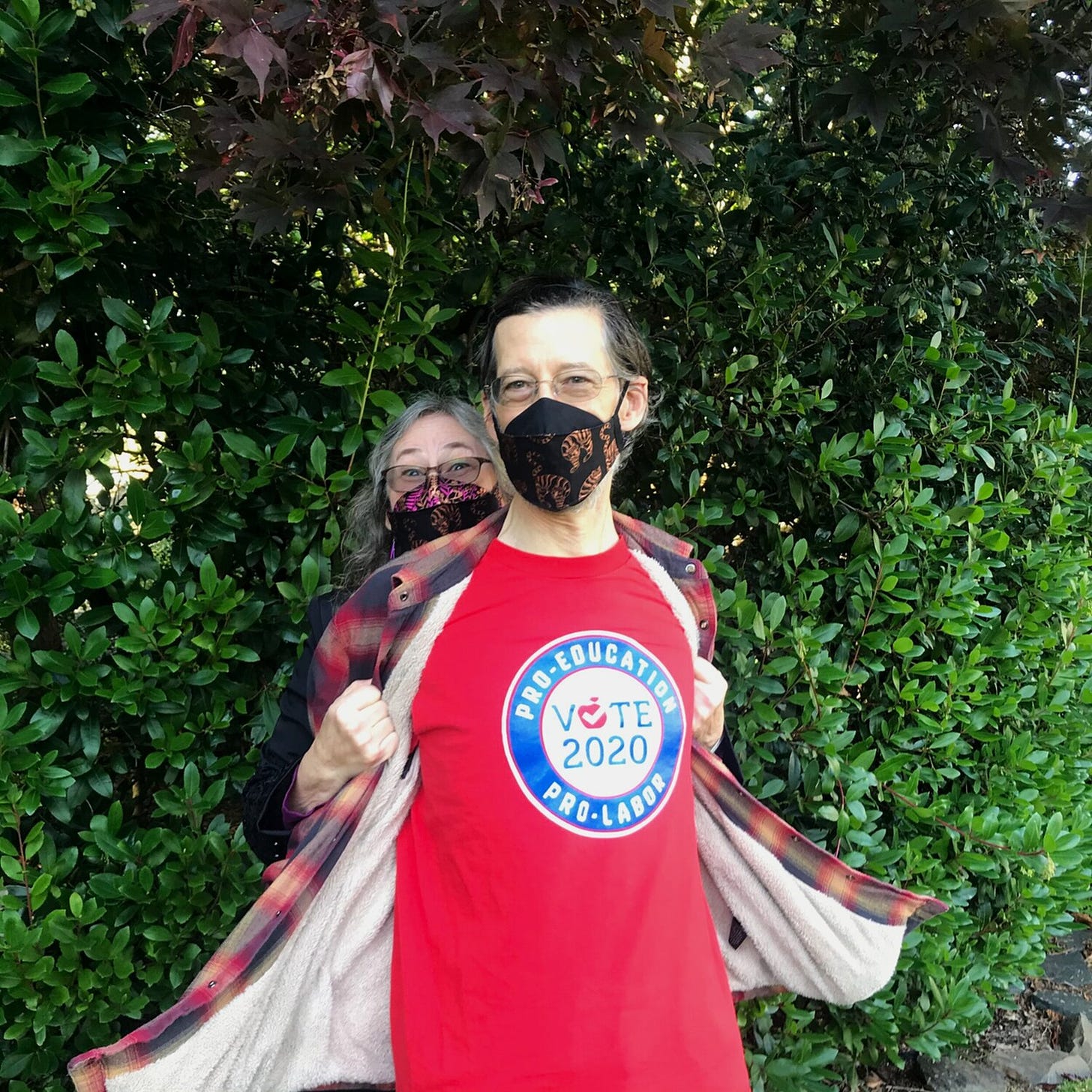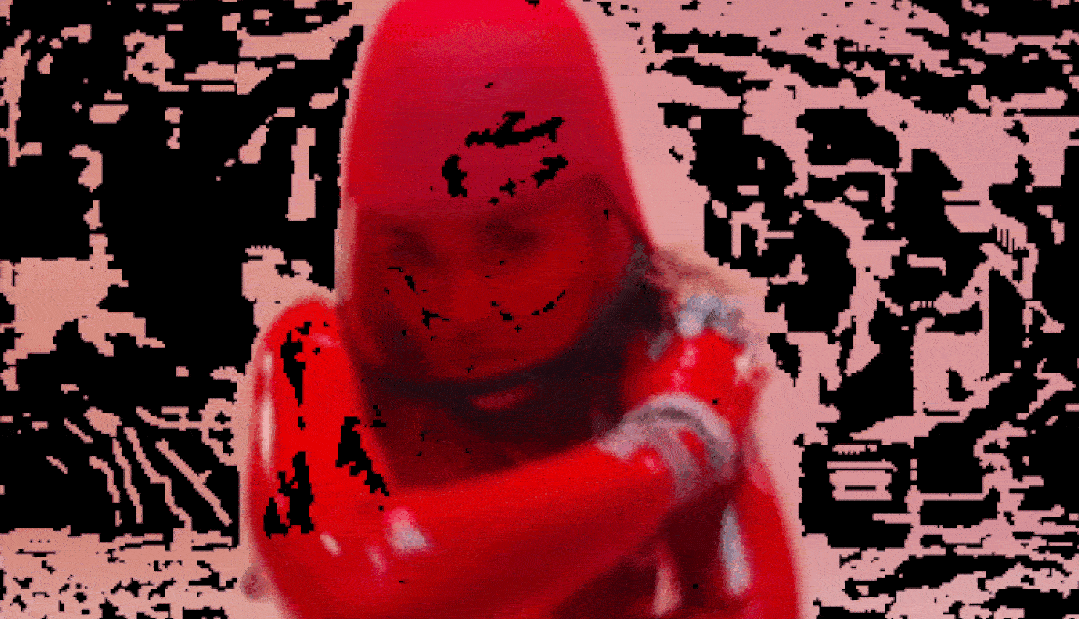First my graduate school thesis project and then winter snow seriously reduced my Dumpster-skimming. (No diving, not yet.) It comforts me to think back on the glory days of the late summer and early fall when I dragged in a kitchen cart—now painted blue and part of our daily cooking—before the garbage truck could take it away. When I found that perfectly good sponge, or that unopened six-pack of White Claw, or the discarded rug pad that I cut into smaller ones for our apartment, or the bottom of a chair that I painted and sold as a plant stand. When I nearly took home an abstract-art coffee table for the same treatment before I noticed it was covered in penis drawings. Nope, I thought, I see why they didn’t donate this one.
I find myself deeply cognizant of the journeys objects take through our lives. And I agree wholeheartedly with the artist Aaron Kramer, who once said that trash is “the failure of imagination.” But as more time passes, the clearer it becomes that actually, trash is a failure of regulation. Whereas the effort I expend—and sometimes, to be frank, this effort is enormous—directly correlates with how ridiculous, if not performative, my behavior becomes. It’s not ridiculous to me (I am unironically enthusiastic about re-use) but it’s a ridiculous expectation: that if everyone cared like I do, which is code for if everyone had time, health, and money like me and had no children or debt, also like me, the gargantuan waste/recycling/consumption/pollution crisis would be solved.
Elizabeth Cline’s essay for Atmos called “The Twilight of the Ethical Consumer” gave me a certain solace, the kind that emerges from realizing it doesn’t have to be this way. Her book Overdressed is about the environmental and workplace ramifications of fast fashion. She explores how garment quality has declined in the last two centuries for people of all economic classes and how we’ve grown accustomed to deceptively cheap clothing. I actually saw her speak a few years ago about this book and her efforts to convince people to buy less and to choose more sustainably made clothing, the culmination of which was her second book, The Conscious Closet. And then 2020 hit, and with it, a realization that ethical consumption is not just inadequate but may even contribute to the very injustices it purports to limit. “I have started to wonder,” she writes, “why we continue to throw away our power on ethical shopping.”
“Unity” by Reyna Noriega.
So now Cline devotes her time to activism. She has experienced that fundamental shift in perspective from encouraging individual responsibility to demanding systemic change. As for me, well, there’s a laminate bookshelf from a friend sitting in my office, waiting to be sanded and re-painted. And when a local apothecary had a 10% off sale last month on bulk items for customers who brought their own containers, I filled old jam jars with shampoo and psyllium husk and the fumes of my own bliss. But this isn’t enough for me anymore.
I am thrilled to tell you this: THERE’S A WAY TO STOP CHARTER/SPECTRUM FROM SENDING YOU (JUNK MAIL) ADVERTISEMENTS CLICK HERE TO BANISH ALL THIS UNWANTED PAPER AND EVEN STOP THE EMAILS, VISITS, AND CALLS. EVERYONE IN THEIR SERVICE AREA DO THIS IMMEDIATELY, gah.
And I find hope in the fact that it’s not up to just me and caps lock to effect change all by our lonesome. It’s silly, if not self-absorbed, to believe this. Instead, I’m looking for comrades and community, because, as I wrote almost a year ago now, if pandemic must rise, may capitalism fall.
Art by J Yang.
It’s a tough call, in this limited attention economy, for me to say whether you need to read the above Elizabeth Cline essay or this interview with food and gender scholar Emily Contois more, but trust me, they’re both absolute gold.
“Taboo” means “banned on grounds of morality or taste” or “banned as constituting a risk.” It is obvious that menstruation is taboo, but you don’t yet know why. Prepare to have your mind blown…. The word “taboo” comes from the Polynesian word “tapua,” which means menstruation.
-Nadya Okamoto, Period Power: A Manifesto for the Menstrual Movement
There’s a period-positive book/zine, available to read for free here, titled Tapua in direct reference to this telling etymology.
So mostly I’m amused by the inadvertent visual resonance between the above photo of a friend’s parents and the below gif of Miley Cyrus, but also, you can view or purchase these lovely, comfortable masks from the Babbletuck shop.
In 2019, with her feminist anthem “Mother’s Daughter,” Cyrus finally articulated her own evolution, alchemizing her teenage rebellion into a stunning music video for the battle cry of a line “don’t fuck with my freedom.” Put another way: she made an underappreciated piece of art, and when I couldn’t find the analysis I craved, I wrote it myself. Read the piece on Mangoprism, here.
Two more excellent (and less intense) music videos:
Before the 2021 Grammys distract us anew, let us revisit Lizzo’s stellar opening act from last year’s show. There are rhinestones dangling from her nails. She absolutely slays her solo on a flute that descends from the ceiling. There’s an all-Black-femme ensemble and ballerinas in light-up costumes. Watch it here.
It is as if this South Korean tourism agency reached into my psyche and drew from it my exact aesthetic preferences in this delightful indie ad. The last time I experienced this sensation, I was looking at a four particular racks of clothes at Macy’s (I was, admittedly, more into neon than I am now.)
Candles and table by Zoe Murphy, who screen-prints her hand-drawn designs on reclaimed materials. See more photos and read about her process here.
Anything that is designed for maximum ‘efficiency’ casts a profound shadow that we rarely take into account: the abdication of human accountability. If you contextualize the time it takes an individual to gather raw materials, which are often living organisms, the honour and grief that is felt in their losses to our ecosystems, the lifetime courtship of a material’s ways, the craftperson’s relationship with their instruments and land, then you have a life which is interwoven with art. You have a person who is beholden to their place in the world and you can trace their wounds and wrinkles to their love of a thing, which they will protect, and which will feed you with its long history, beauty, and richness. A person like this thinks twice about ‘developing’ an unblemished piece of land.
-Toko-pa Turner, Belonging: Remembering Ourselves Home
On Monday, February 22nd, a recording of my presentation as part of GradCon will be listed for viewing on the conference website. It’s called “Love Beyond Oil: Intimacy as the Way Out of Extraction,” and it will examine the same eros that Turner so beautifully articulates above. Scholarly inquiry and sock-darning anecdotes will coalesce in this 12-15 minute video about how the literal extraction of oil is a useful rhetorical framework for understanding oppression.
Photo of Casil McArthur by Donna Trope for GQ. Someday I’d like a suit like this one.
Last year I wrote and collaged a spring 2020 time capsule of a zine called “Hell, I Dance Therefore I Am.” After a multi-hour printing saga (and the formation of new bonds with the employees working at PawPrint last Friday afternoon), physical copies now exist. If you would like me to send you the digital version or mail you the printed one, respond to this email or contact me through my website, abbyseethoff.com. I am happy to distribute these for free.
Were you interested in off-setting the cost of this project, however, here are some suggestions: $3 covers shipping; $3.50 covers printing; $6.50 covers them both; for $7.50 I’ll send you a zine in a shiny mailer; for $21 I’ll mail it to you in a handmade fused plastic pouch (there is only one of these available) (this is the most meta packaging option, trust me.)
Turns out that waiting too many months between newsletters leaves the Bombazine bookmarks folder bursting with links to share, so the next epistle will likely arrive sooner than later. But I really believe in limiting email fatigue, quality over quantity, etc. So not too soon.
In solidarity,
Abby








